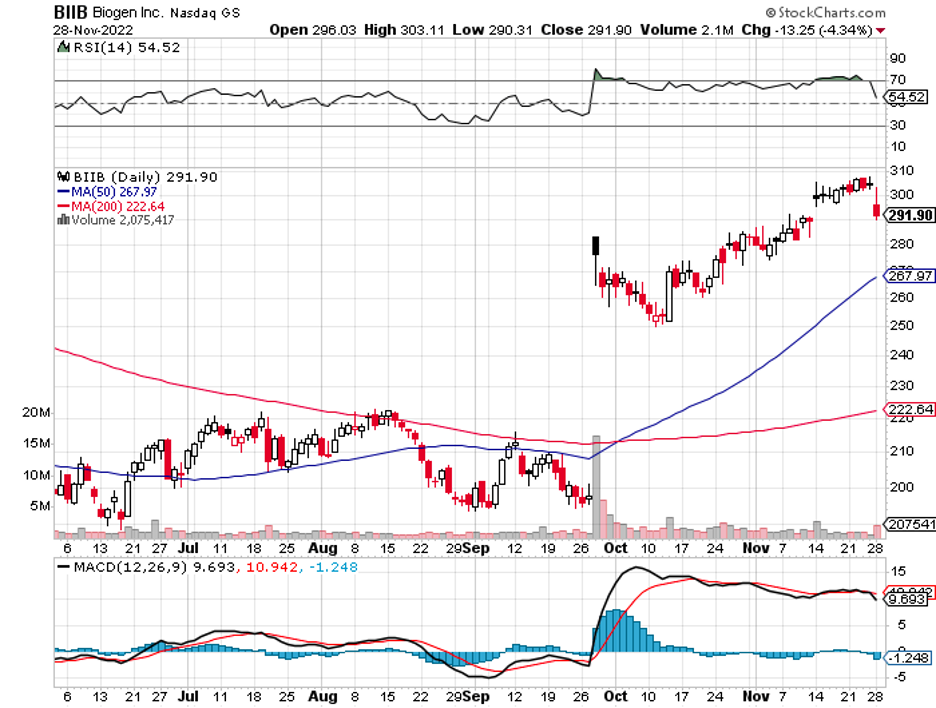Do or Die for This Biotech
Investors are about to discover whether Biogen’s (BIIB) latest Alzheimer’s drug, which it developed in collaboration with Eisai (ESALY), is truly as effective as they claim.
A few months ago, the partners disclosed that the drug, called Lecanemab, exceeded their expectations in the Phase 3 study. Results should be out anytime this week.
Reports show that the drug offered a statistically significant decrease in the cognitive decline of the 1,800 participants included in the trial. Biogen anticipates a FED decision for its application for accelerated approval by January 6, 2023.
Meanwhile, traditional regulatory approval in the United States, Japan, and Europe is expected by March 2023.
Basically, Biogen and Eisai believe that Alzheimer’s symptoms are linked to particular plaques that accumulate in a patient’s brain.
Despite the expectations over the results for Lecanemab’s Phase 3 trial results, the enthusiasm for the scientific hypothesis on which the treatment is based had dwindled after years of underwhelming results.
Apart from that, Biogen’s previous failure remains fresh in the minds of investors. Back in June 2021, shares of both Biogen and Eisai climbed exponentially when the Food and Drug Administration suddenly gave the green light for their previous Alzheimer’s drug, Aduhelm.
Unfortunately, this momentum wasn’t sustained because Aduhelm’s commercial promise failed to be realized. This is because there are so many factors that could quickly derail the success of a product.
Equally crucial to receiving approval from the FDA is whether the drugmakers can persuade the Centers for Medicare and Medicaid Services, which is behind the widely used Medicare program, to cover the expenses of patients needing the drug.
At that time, the CMS decided to refuse reimbursements for Aduhelm. This move effectively sunk any chances of Biogen and Eisai to salvage that Alzheimer’s candidate.
Considering the budget allocated for Aduhelm from the time of its inception to commercialization, Biogen shares practically went on a free fall when the drug was eventually scrapped and development was shut down. Needless to say, this makes Lecanemab a do-or-die candidate for Biogen’s Alzheimer’s program.
Although the broader market is focused on its Alzheimer’s candidates, Biogen has an extensively diverse pipeline. The biotech is aggressively pursuing treatments for some of the most challenging to crack older-age conditions, with substantial sales and income potential.
This covers segments including depression, amyotrophic lateral sclerosis (ALS) or Lou Gehrig’s disease, Parkinson’s, lupus, cancer, and even multiple sclerosis. To date, it has 12 solid programs expected to go through Phase 3 trials or queued for regulatory approvals in the following months.
The promise that the success of Lecanemab holds is what keeps Biogen on the radar of many investors. These days, the stock is trading somewhere between $280 and $290.
If the biotech’s latest candidate for Alzheimer’s disease actually manages to meet (or exceed) expectations and hit the market, then the price could reach $370 or more.
Meanwhile, peak sales for Lecanemab are projected to be $14 billion—a figure substantially higher than Biogen’s recent revenue base.
However, there are risks to this investment.
Obviously, any investor buying Biogen stock must deal with the risk of a repeat of the Aduhelm drug debacle. That means the biotech, which regularly trades somewhere in the $200s, could face a minimum of $80 dip or roughly 30% loss.
Overall, Biogen can be considered cheap if we base it on the potential approval of Lecanemab. But, this biotech faces a binary situation where any disappointing result or a failure to gain regulatory approval could send the stock spiraling to new lows.
Meanwhile, an outlier scenario for investors to consider is that Biogen remains an immensely attractive target for a takeover by a bigger and more successful biopharmaceutical company. It offers a one-of-a-kind and solid growth pipeline with a reasonably sound valuation on trailing results that are rare in this economic condition.

